Should I keep turtles as pets in Vietnam?
Vietnam is currently experiencing the effects of another wave of COVID-19 cases, likely due to the increased infectiousness and spread of new variants of the virus. Although the hypothesis that COVID-19 originated in wild animals has not been fully confirmed, the range of other zoonotic diseases (i.e. diseases transmitted to humans from wild animals) known to science tell us that exposure to these species may pose a serious risk of infection and are a likely source of the COVID-19 virus.
Keeping wild animals as pets is not uncommon in Vietnam with some of the most sought after pets being tortoises and freshwater turtles. Today, we will try to address the potential risks of keeping tortoises and freshwater turtles as pets and answer the question: Is it good or bad to keep turtles as pets in Vietnam?
We will explain in more detail some of the likely problems of keeping turtles, such as (1) turtles can be a source of infection; (2) it is not easy to keep turtles in captivity; (3) it is often illegal to keep turtles as pets and (4) to meet the demand for pet trade, more wild turtles are being hunted and traded.
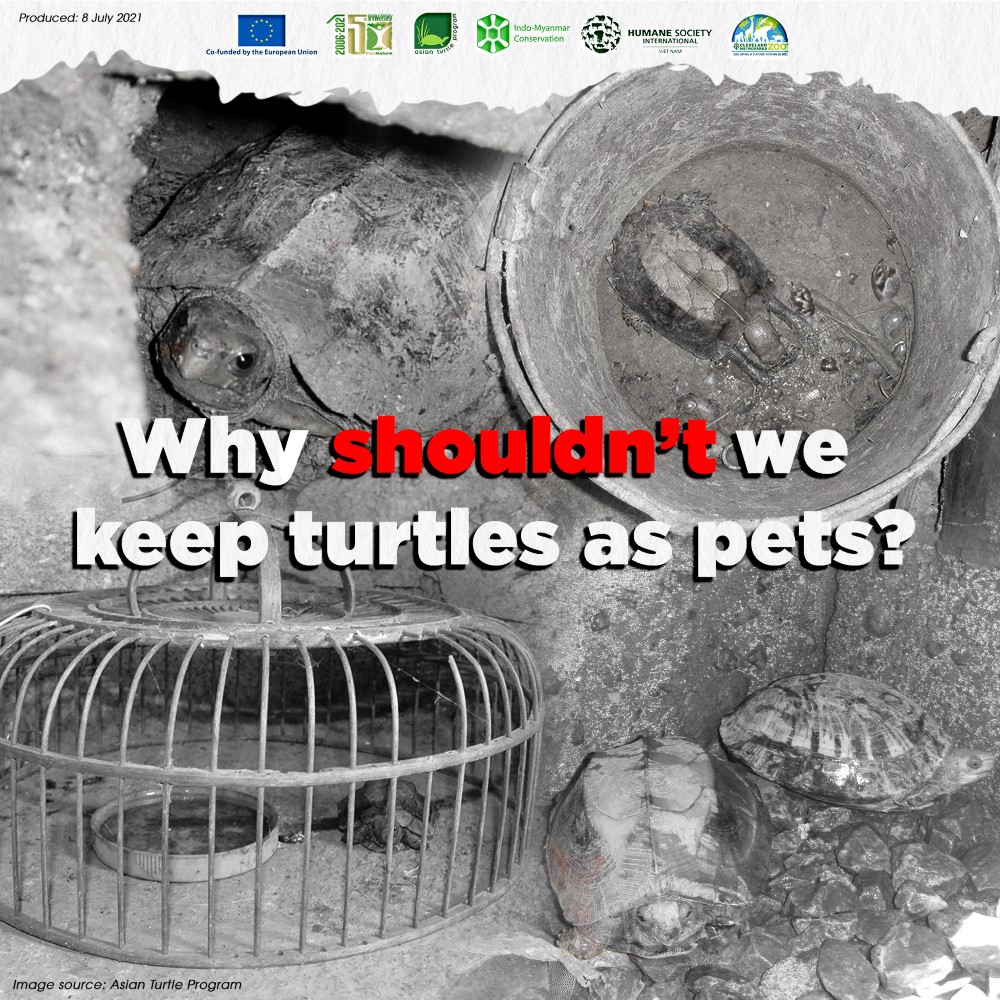
Source: ATP/IMC
First of all, turtles are known to be sources of disease for humans. Salmonella is a group of bacteria (of the Salmonella genus), well-known for causing food poisoning, or more accurately, Salmonellosis. While usually not serious, some people may develop severe illness from it which can even be fatal. The US Food and Drug Administration warns that “Turtles commonly carry bacteria, Salmonella bacteria, on their outer skin and shell surfaces that can make people very ill” (1) and the Centre for Disease Prevention and Control (CDC) estimates that Salmonella causes about 1.35 million infections, 26,500 hospitalizations, and 420 deaths in the United States alone every year (2). Salmonella can be contracted from food that has been undercooked, or is poorly prepared, and is often associated with pork and poultry, such as chicken or duck. However, Salmonella outbreaks have also been linked to turtles. During 2006–2014, a total of 15 multistate turtle-associated salmonellosis outbreaks which accounted for 921 illnesses, 156 hospitalizations, and the death of a 3.5-week-old infant were reported to the US CDC (3). Unfortunately, the link between turtles and Salmonella is not as well-studied in Vietnam and furthermore, research on turtle-borne infections is still limited, so there is potential for other turtle pathogens that could spread to humans.
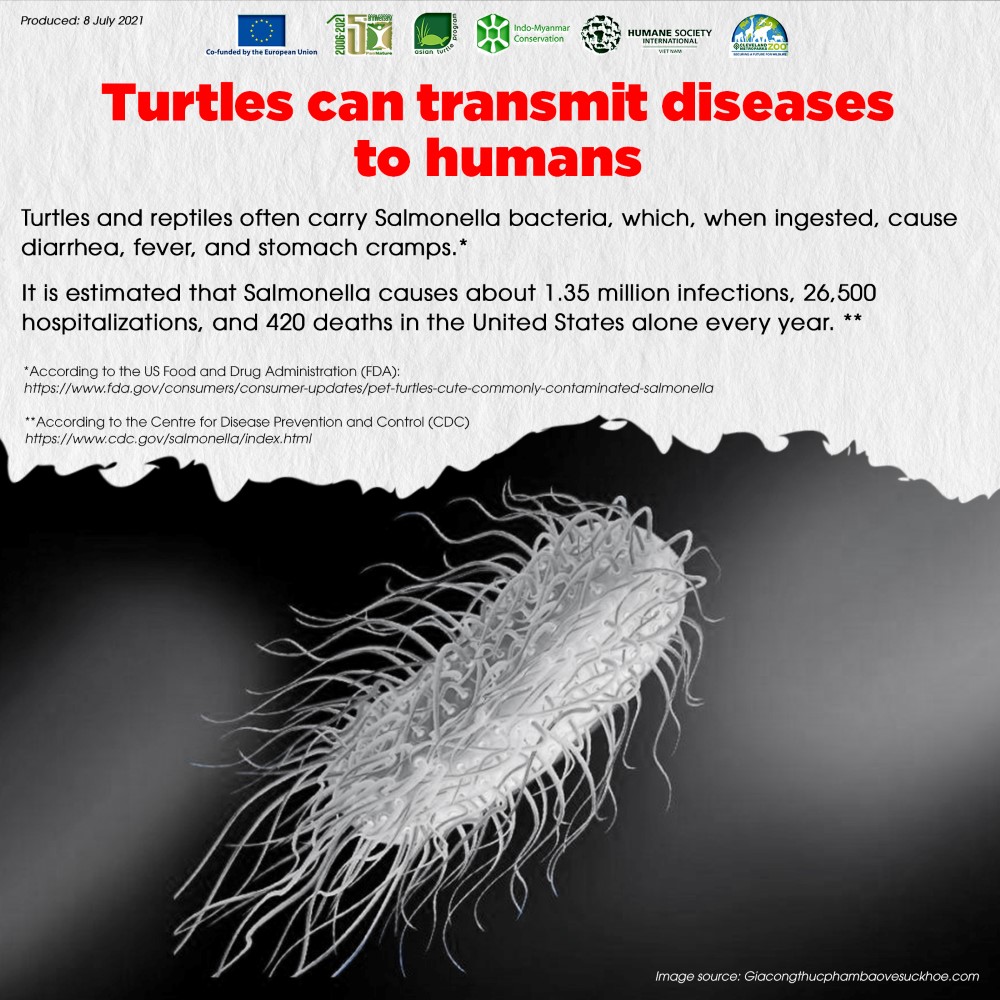
Source: ATP/IMC
Secondly, despite often being attributed as low-maintenance as pets, turtles are actually difficult to keep in many cases. With very different requirements in diet and habitat between species and a limited understanding of these needs amongst most pet keepers means that turtles in captivity tend to be kept in unsuitable conditions, leading to more stressed, diseased and have a shorter lifespan than their wild counterparts. Diet, temperature, UV light, population density etc. are some of the many notable factors to take into consideration to maintain a suitable and stable environment for turtles. Obviously, each turtle species will have different requirements for these essential factors. For instance, the Big-headed Turtles (Platysternon megacephalum) are a challenging species to keep and breed in captivity due to their fierce, territorial nature. When rescuing the animals confiscated from wildlife trade, the Asian Turtle Program (ATP) of Indo Myanmar Conservation (IMC) has witnessed numerous injuries, some severe, on individuals kept together in the trade during captivity or transportation. In May 2021, it was reported that 52 turtles of varying species and sizes were confiscated from a pagoda in Ho Chi Minh city(4); the turtles had been living in an overcrowded enclosure with a small, dirty pond. Without a proper environment it is expected these animals were suffering stress and likely health issues. While many other species of animal, such as primates and large mammals, show emotions and distress much more clearly, turtles tend not to be as reactive in a way humans can empathize with and may only show effects of poor captive management later when their health rapidly deteriorates.
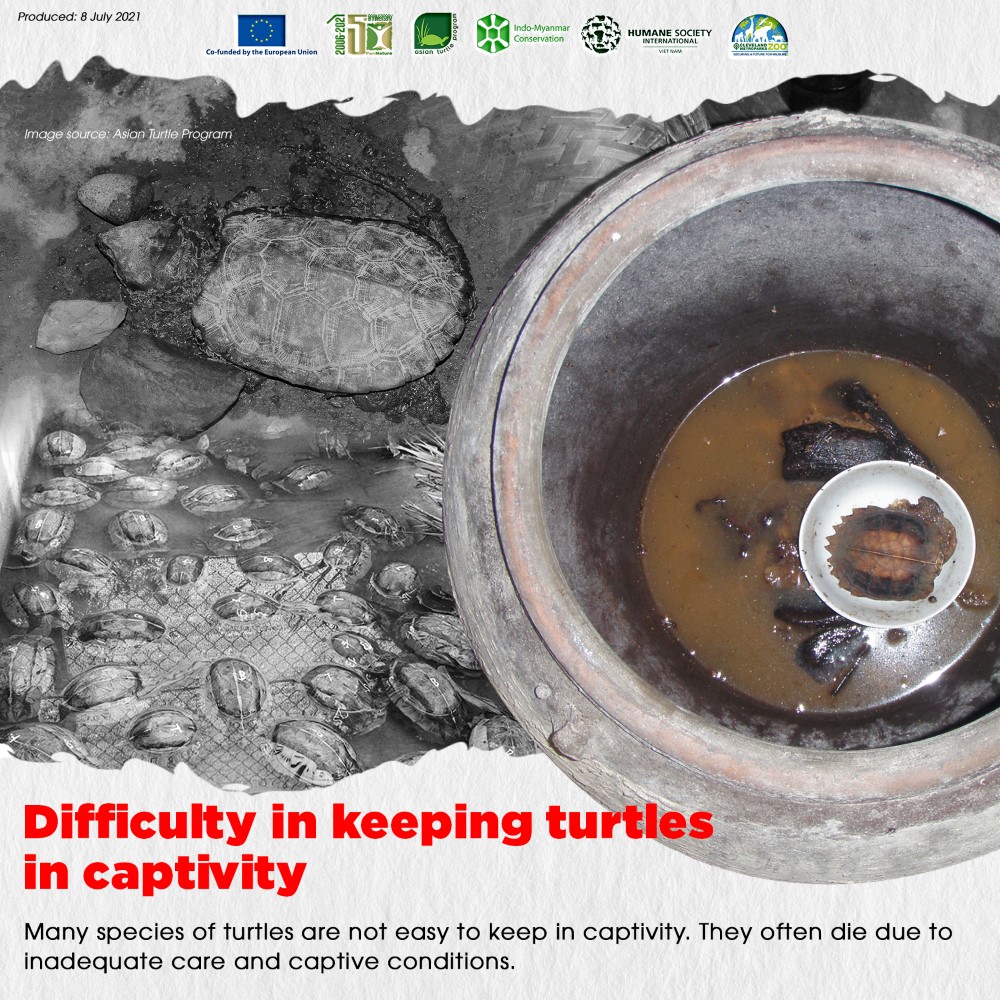
Source: ATP/IMC
Thirdly, the act of keeping turtles illegally can lead to criminal prosecution. As most of Vietnam’s native tortoise and freshwater turtle (TFT) species and 5 marine turtle species are protected under the national laws; it is stipulated in Vietnam’s Criminal Code 2015 that all violations of laws against protected species, can result in criminal prosecution with a maximum penalty of up to 15 years imprisonment for individuals or VND 15 billion (USD $650,000) for legal entities. In March 2021, the court sentenced the accused, H.M.T. to 10 years imprisonment for illegally keeping 127 endangered, rare and precious turtles (5); the animals had been confiscated from the accused’s house in Buon Ma Thuot City, Dak Lak Province in May 2020. Unfortunately, often people in Vietnam are not aware of which species are protected, which is why ATP is committed to spreading awareness of each species, how they are legally protected and why.
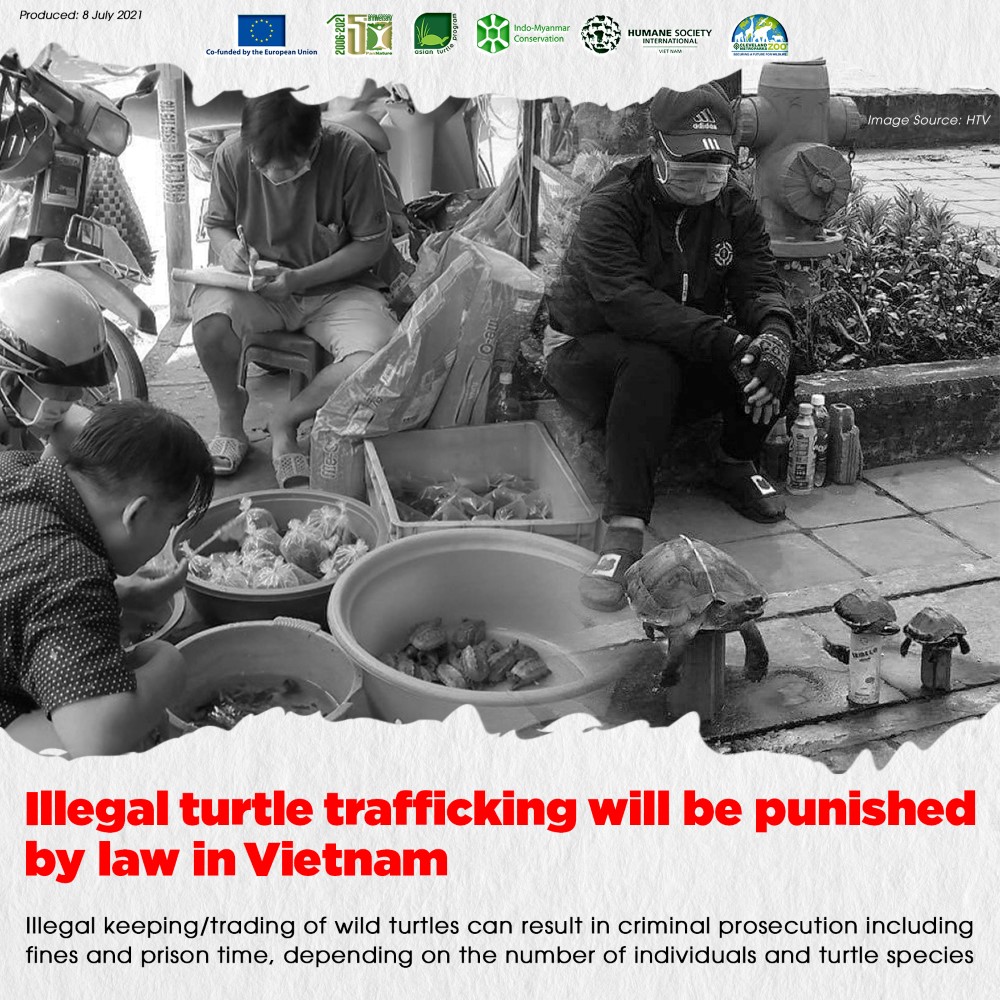
Source: ATP/IMC
Some might believe or argue that when keeping Vietnam’s native TFT species is a violation against the national law, it might be legal for them to buy and keep exotic pets instead. However, the keeping, breeding or trading of many exotic species, especially the invasive Red-eared Slider (Trachemys scripta elegans) (6) in Vietnam is illegal under national law (as stipulated in the government’s Decree 155/2016/ND-CP; amended and supplemented by Decree 55/2021-ND-CP on administrative penalties for violations against environmental protection regulations) too. For the Red-eared Slider, this is mainly due to concerns that this species will establish populations as an invasive species that could negatively impact native species.
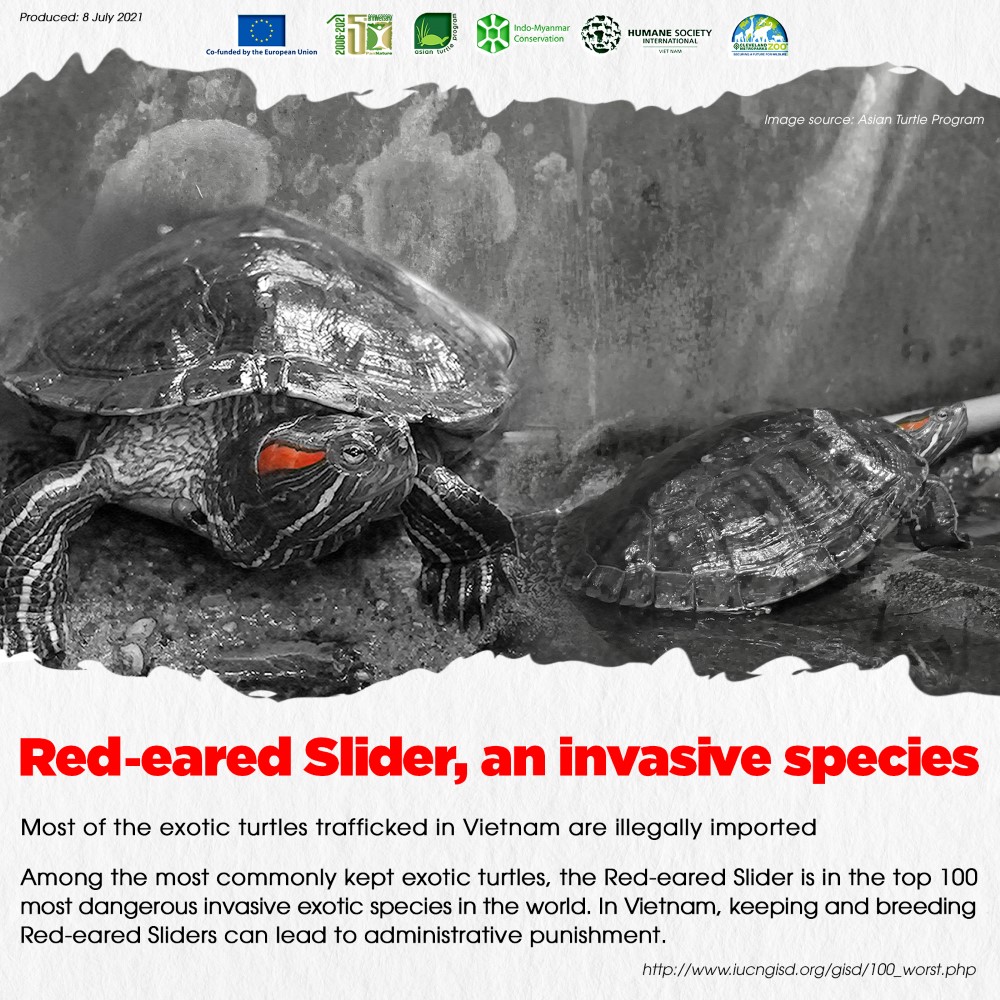
Source: ATP/IMC
Lastly, the profitability of the pet trade, particularly in Asia, has continued to increase the demand for collecting turtles from the wild. In the past, turtles were mainly hunted for local consumption as food and medicine; nowadays these turtles are now traded widely for food, medicine and as pets. Demand for native species is still high, but we are now seeing increased demand for exotic, “unique” turtles which has reinforced the level of illegal cross-border trafficking. As long as it is still a lucrative business (7), it is hardly possible to control wildlife trade even with severe punishment. In any case, the purchase of turtles to keep as pets plays a key role in supporting this illegal activity and harming wild populations of turtles.
When considering human health, animal welfare, legal issues and the illegal wildlife trade, it is undeniable that keeping turtles as pets does more harm than good. It is considering these points that we would kindly advise you not to buy and keep turtles as pets in Vietnam.
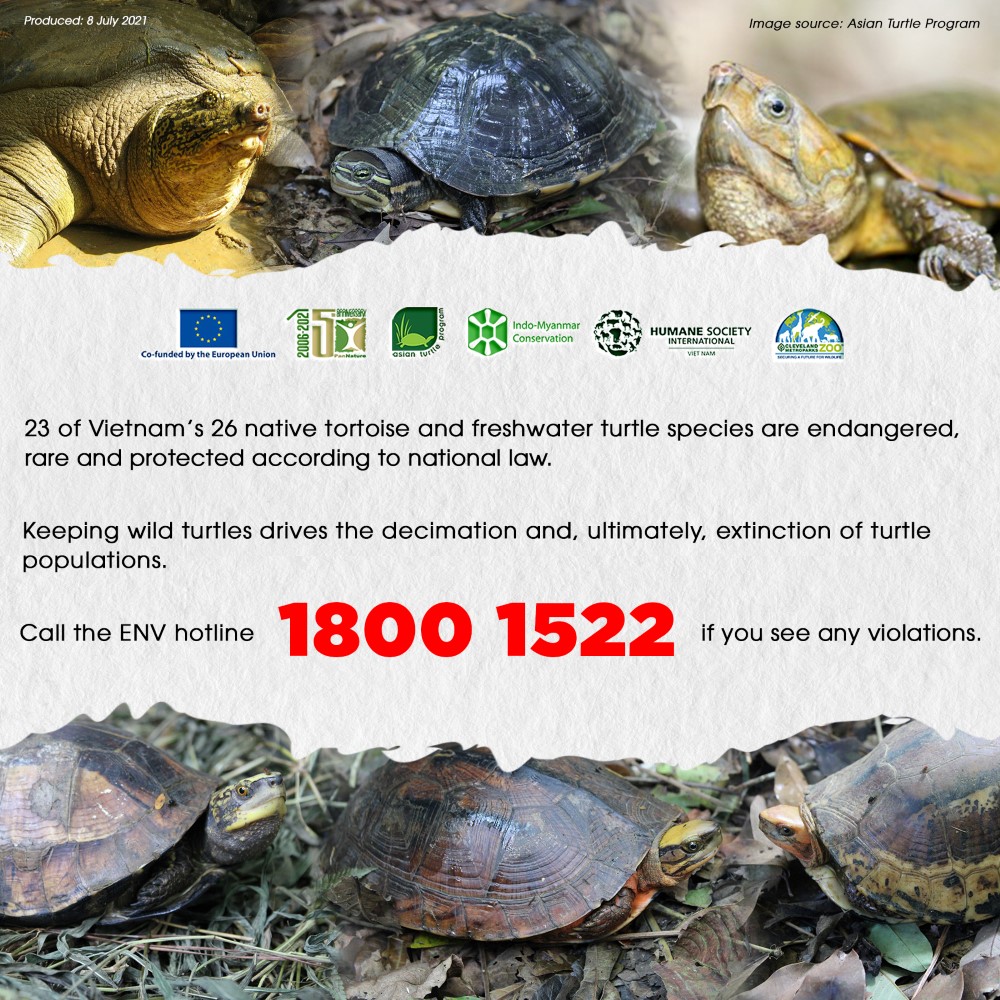
Source: ATP/IMC
Date: 8th July 2021
Press release: Bich Kieu – ATP/IMC
References:
- https://www.fda.gov/consumers/consumer-updates/pet-turtles-cute-commonly-contaminated-salmonella
- https://www.cdc.gov/salmonella/index.html
- https://wwwnc.cdc.gov/eid/article/22/7/15-0685_article
- https://www.facebook.com/trungtamgiaoducthiennhien/posts/2940916329459966
- https://dantri.com.vn/phap-luat/con-trai-rao-ban-rua-cha-nhan-10-nam-tu-20210319162936191.htm
- http://www.iucngisd.org/gisd/100_worst.php
- https://fcpablog.com/2020/04/27/the-illegal-wildlife-trade-is-still-one-of-the-most-profitable-criminal-enterprises/
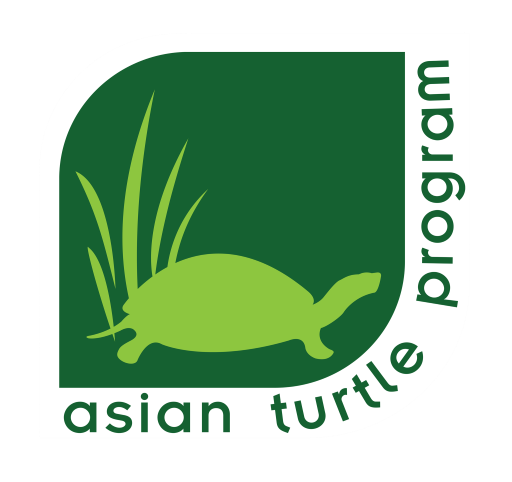
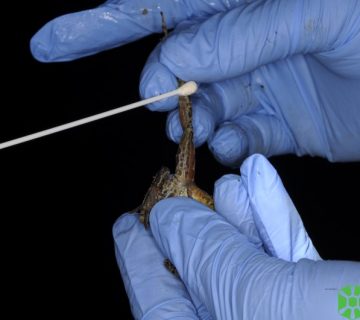
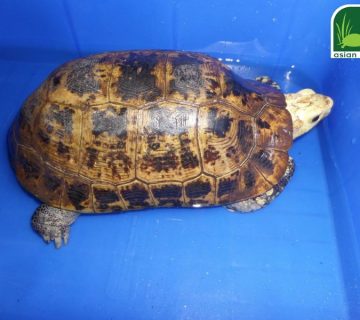
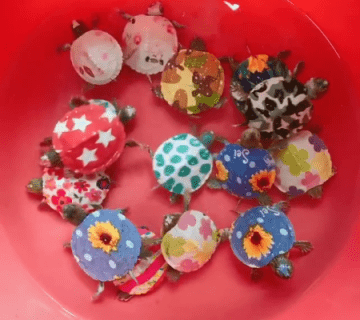
No comment